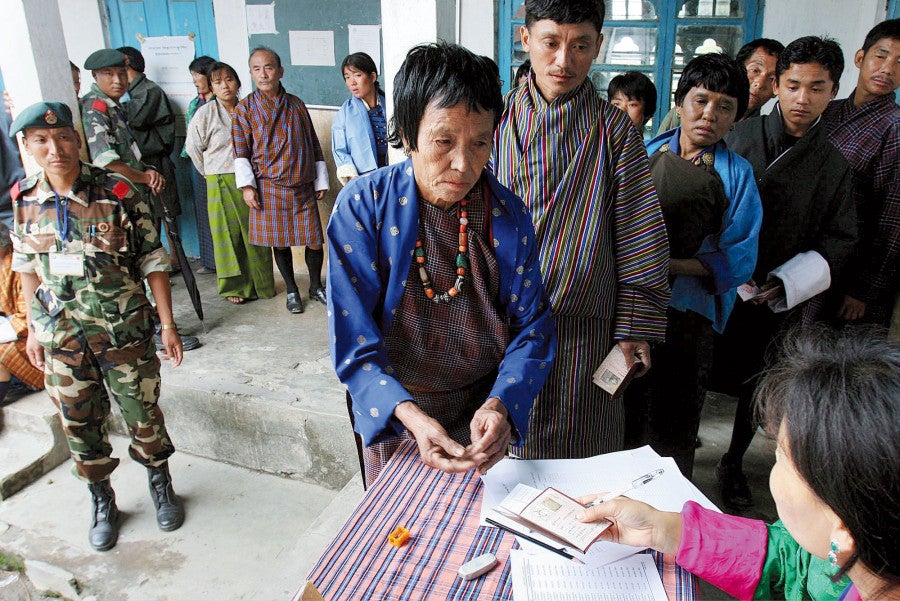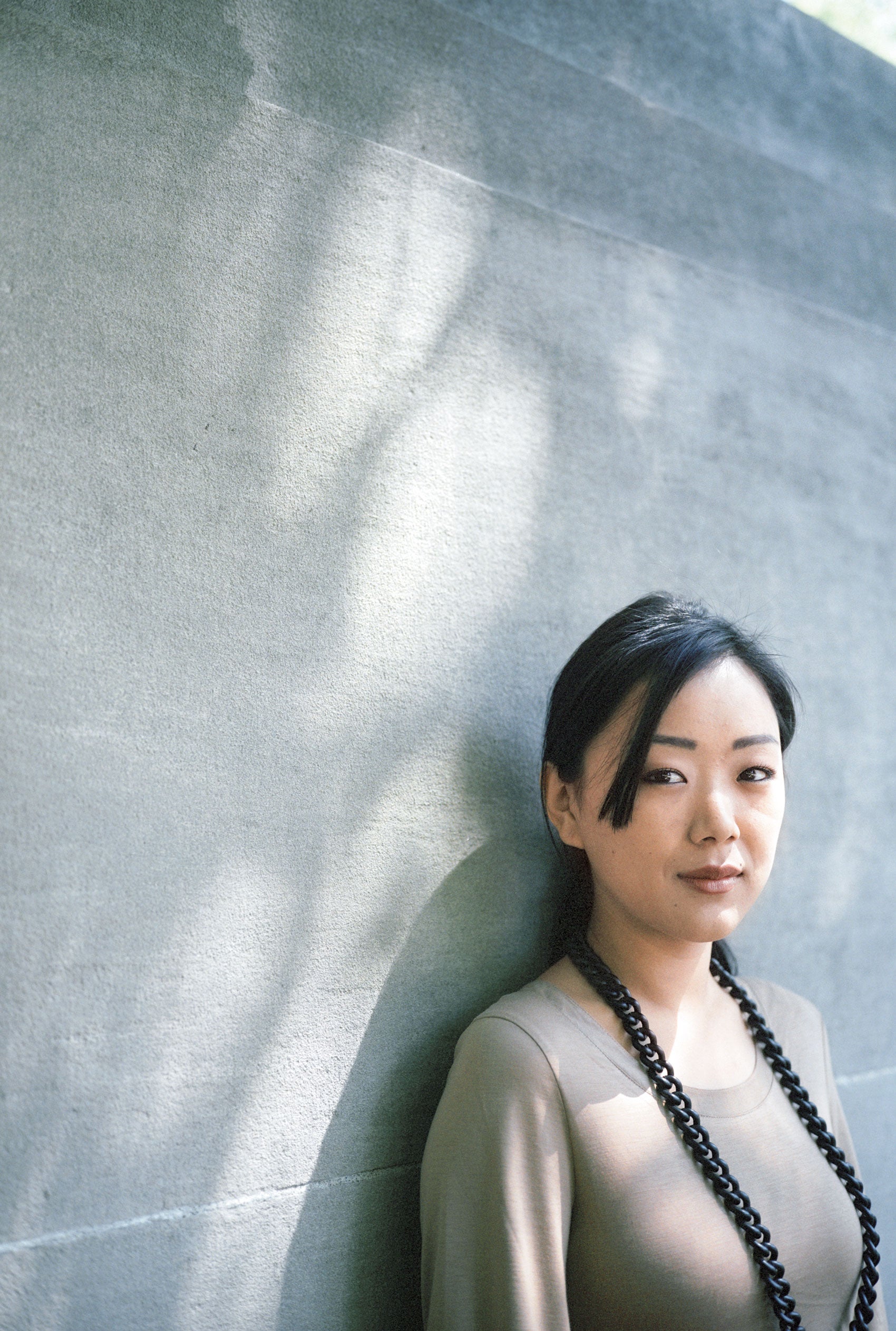In Bhutan, a constitution is in the offing. Will it raise the “gross national happiness”?
As HRH Princess Sonam Wangchuck LL.M. ’07 studied comparative constitutional law in Pound Hall this spring, her native Bhutan was in the midst of its own course in constitutional democracy.
Her father, King Jigme Singye Wangchuck, had been modernizing the tiny Himalayan kingdom most of Sonam’s life, gradually decreasing the power of an absolute monarchy. By 2005, at his behest, a constitution was drafted, outlining the workings of a two-party constitutional monarchy in which the king is head of state—but not of the government—and parliament has the power to oust him with a two-thirds majority.
Bhutan is the last country in the region without a politically elected government—a latecomer to what Professor Mark Tushnet calls “a worldwide movement in the direction of adopting democratic constitutions.” But according to Tushnet, rather than leading these transformations, elites in power are usually the obstacle.
“My father always said that you can’t leave the future of the country in the hands of one person,” Sonam recalls. But, she says, he believed that “people need to be educated to a certain level before they can embrace democracy.”
As he gradually modernized the Buddhist country—achieving gains in literacy and a decline in child mortality—Sonam’s father invented his own measure for gauging progress. Instead of gross national product, he decided “gross national happiness” should be the yardstick, involving harmony with nature, good government, equity and connection to cultural heritage.
Beginning in 2001, a 39-member committee—including the chief justice, the speaker of the National Assembly and members of local government—looked at more than 100 constitutions. The committee was particularly influenced by South Africa’s, Sonam says, because of its strong protection of human rights. But the final product also reflects Bhutan’s religion and the king’s philosophy.
Although the constitution recognizes Buddhism as “the spiritual heritage of Bhutan,” freedom of religion is among the fundamental rights. Others include a presumption of innocence, freedom of expression and equal pay for equal work. But the document also refers to fundamental duties, such as the obligation to help the victims of accidents.
And, harking back to Bon, the nature-focused religion that preceded Buddhism and is still practiced today in some rural areas, says Sonam, the constitution charges the citizens and the state with preserving the environment, stipulating that more than 60 percent of the country remain covered by forest for all time.
Preservation of Bhutan’s culture and heritage is also a duty. That, according to Sonam, “has a lot to do with [maintaining] sovereignty.” Known to its people as the land of the thunder dragon, Bhutan is a little larger than Switzerland, but its population is estimated at just over 700,000. “We’re in between two giants, China to the north, and India is surrounding us east, west and south. And we have always been an independent country,” she says. “Promoting our culture is extremely important … so that we don’t just blend in with our neighbors.”
But many of the rights enumerated in the constitution are restricted to citizens, and the bar for achieving that status is high. Because Bhutan is a small country that provides free health care and education to its people, it must be “a little more stringent,” Sonam says. “Problems with immigrants in the early ’90s” may have inspired those restrictions, she adds. During that period, ethnic Nepalis fled Bhutan, or were expelled, after a crackdown on political ferment, and more than 100,000 are stranded in refugee camps in Nepal.
After drafts of the constitution were distributed across Bhutan, Sonam and her father traveled the country to meet with citizens. “There were lots of concerns,” she says. People didn’t like the fact that the king must retire at 65, for example. “And there were just apprehensions. I think they were a little nervous—especially rural Bhutan—about having people in the city forming political parties.” (Up until now, the state has not allowed the formation of political parties.)

This spring, the people’s education continued as the government sponsored mock elections and citizens lined up to practice voting.
While Sonam was finishing her first semester at HLS, her father abdicated the throne in favor of her eldest brother. She speculates that he stepped down before the constitution was ratified so that there could be a period of transition and not all the changes would occur during his rule. At 26, King Jigme Khesar Namgyel Wangchuck is the world’s youngest head of state. But, says Sonam, “Our father became king when he was 16, so my brother’s quite old.” She laughs. “He’s had enough time to prepare.”
Polygamy is legal in Bhutan, and Sonam and the new king have eight other siblings, whose mothers are sisters. As children, she and the others played at governing the kingdom. It was a game, she recalls, but they were seriously inspired by their father “and we each wanted to do something to help the country.” Sonam chose law. After getting a B.A. in international relations from Stanford, she clerked for the High Court of Bhutan before coming to HLS.
The constitution is slated to be ratified in 2008; after that, parliamentary elections will take place and the country’s Supreme Court, with final authority over matters related to the constitution, will be established. Sonam came to HLS to study constitutional law. She returns with hopes of strengthening Bhutan’s judiciary and its developing legal system. She is bolstered by her field of study, in which few lawyers in the kingdom have training. She also values the friendships she formed at HLS and the new knowledge she gained “about the situations and different experiences of so many lawyers from different countries.” In her own country, she is particularly concerned with rural areas, where people could easily be left behind in the wake of modernization.
As for the larger issue of Bhutan’s fate under the new system: “We’re optimistic, but at the same time a little nervous because of the direction that democracy is taking in our neighboring South Asia—with corruption,” she says. In 2006, to prepare for the transition, the government passed a bill setting up the framework for investigating and prosecuting corruption. “Lots of challenges can come up. So you have to hope for the best, but, as my father always says, ‘You have to plan into the future! You have to plan. Never just do anything on a whim.’”
